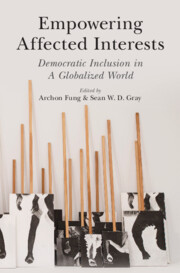
-
- You have access
- Open access
- Cited by 2
-
Cited byCrossref Citations
This Book has been cited by the following publications. This list is generated based on data provided by Crossref.
Gray, Sean W.D. and Warren, Mark E. 2024. What kind of power can citizens exercise beyond the state? Globalizing democracy through representative claim-making. International Theory, Vol. 16, Issue. 3, p. 382.
Tanasoca, Ana 2024. Proportionality in Its Place: Weighted Internal Deliberation. Res Publica,
- Publisher:
- Cambridge University Press
- Online publication date:
- November 2024
- Print publication year:
- 2024
- Online ISBN:
- 9781009453981
- Creative Commons:
-
This content is Open Access and distributed under the terms of the Creative Commons Attribution licence CC-BY-NC 4.0 https://creativecommons.org/creativelicenses


